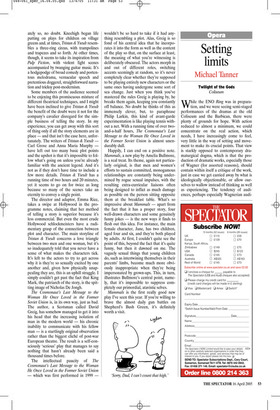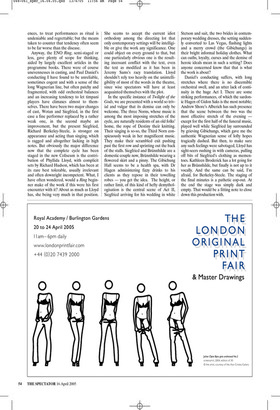Setting limits
Michael Tanner
Twilight of the Gods Coliseum While the ENO Ring was in preparation, and we were seeing semi-staged performances of the dramas at the old Coliseum and the Barbican, there were plenty of grounds for hope. With action reduced to almost a minimum, we could concentrate on the real action, which needs, I have increasingly come to feel, very little in the way of setting and movement to make its crucial points. That view is starkly opposed to contemporary dramaturgical dogma, which is that the production of dramatic works, especially those of Wagner (for assorted reasons), should contain within itself a critique of the work, just in case we get carried away by what is ideologically objectionable, or allow ourselves to wallow instead of thinking as well as experiencing. The tendency of audiences, perhaps especially Wagnerian audi ences, to treat performances as ritual is undeniable and regrettable; but the means taken to counter that tendency often seem to be far worse than the disease.
Anyway, the ENO Ring, semi-staged or less, gave plenty of scope for thinking, aided by largely excellent articles in the programme books. There were of course unevennesses in casting, and Paul Daniel’s conducting I have found to be unreliable, sometimes cogent and with a sense of the long Wagnerian line, but often patchy and fragmented, with odd orchestral balances and an increasing tendency to let timpani players have climaxes almost to themselves. There have been two major changes of cast, Wotan and Siegfried, in the first case a fine performer replaced by a rather weak one, in the second maybe an improvement, but the present Siegfried, Richard Berkeley-Steele, is stronger on appearance and acting than singing, which is ragged and altogether lacking in high notes. But obviously the major difference now that the complete cycle has been staged in the new Coliseum is the contribution of Phyllida Lloyd, with complicit sets by Richard Hudson, which has been at its rare best tolerable, usually irrelevant and often downright incompetent. What, I have often wondered, would a Ring beginner make of the work if this were his first encounter with it? About as much as Lloyd has, she being very much in that position. She seems to accept the current idiot orthodoxy among the directing lot that only contemporary settings will be intelligible or give the work any significance. One could object on every ground to that, but one particularly obvious one is the resulting incessant conflict with the text, even the text as modified as it has been in Jeremy Sams’s racy translation. Lloyd shouldn’t rely too heavily on the unintelligibility of most of the words in the theatre, since wise spectators will have at least acquainted themselves with the plot.
In the specific instance of Twilight of the Gods, we are presented with a world so trivial and vulgar that its demise can only be welcome. The three Norns, whose music is among the most imposing stretches of the cycle, are naturally residents of an old folks’ home, the rope of Destiny their knitting. Their singing is so-so, the Third Norn conspicuously weak in her magnificent music. They make their scrambled exit pushing past the first row and sprinting out the back of the stalls. Siegfried and Brünnhilde are a domestic couple now, Brünnhilde wearing a flowered skirt and a pinny. The Gibichung Hall seems to be a health spa, with Dr Hagen administering fizzy drinks to his clients as they repose in their towelling robes — you get the idea. The height, or rather limit, of this kind of hefty demythologisation is the central scene of Act II, Siegfried arriving for his wedding in white Stetson and suit, the two brides in contemporary wedding dresses, the setting suddenly converted to Las Vegas, flashing lights and a merry crowd (the Gibichungs) in their bright informal holiday clothes. What can oaths, loyalty, curses and the demise of heroic ideals mean in such a setting? Does anyone concerned know that that is what the work is about?
Daniel’s conducting suffers, with long stretches where there is no discernible orchestral swell, and an utter lack of continuity in the huge Act I. There are some striking performances, of which the sardonic Hagen of Gidon Saks is the most notable; Andrew Shore’s Alberich has such presence that the scene between the two was the most effective stretch of the evening except for the first half of the funeral music, played well while Siegfried lay surrounded by grieving Gibichungs, which gave me the authentic Wagnerian sense of lofty hopes tragically dashed. But then, to make sure any such feelings were sabotaged, Lloyd has sight-seers rushing in with cameras, pulling off bits of Siegfried’s clothing as mementoes. Kathleen Broderick has a lot going for her as Brünnhilde, but finally is not up to it vocally. And the same can be said, I’m afraid, for Berkeley-Steele. The staging of the final minutes is a pathetic cop-out. At the end the stage was simply dark and empty. That would be a fitting note to close down this production with.

























































 Previous page
Previous page